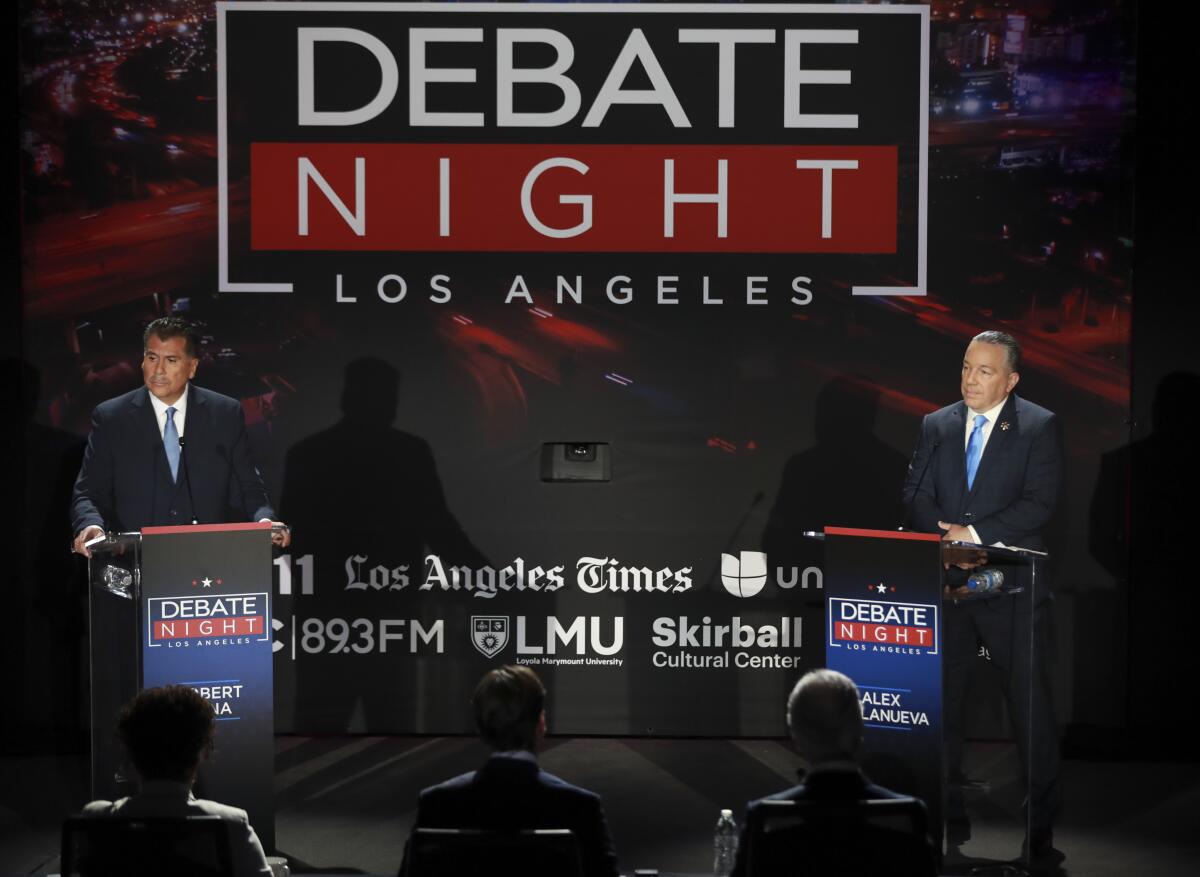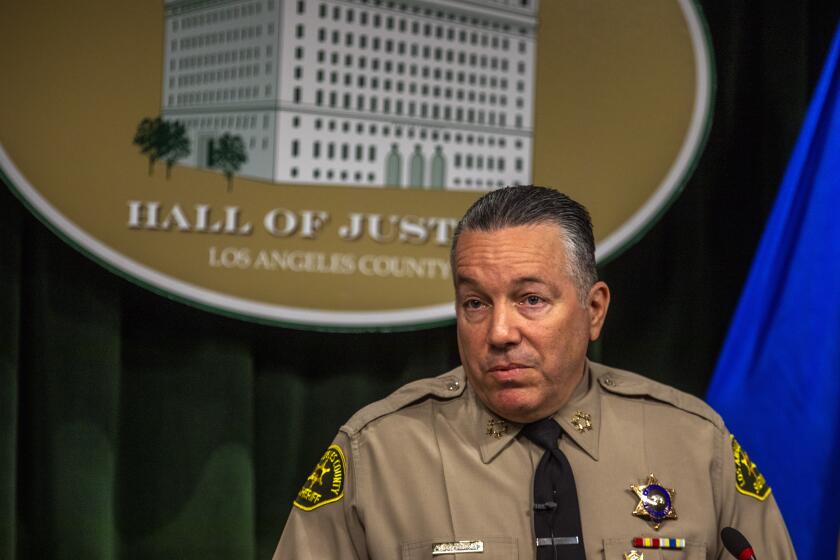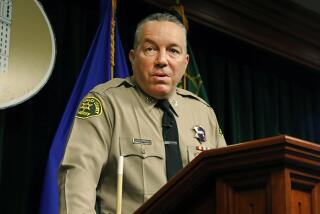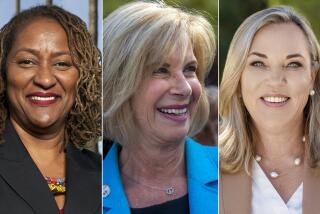Challenger Robert Luna holds lead over L.A. County Sheriff Villanueva, new poll shows

- Share via
In the race for Los Angeles County sheriff, retired Long Beach Police Chief Robert Luna has a formidable, 10-point lead among likely voters over the incumbent, Alex Villanueva, a new poll shows.
With little more than a month until the Nov. 8 runoff election, 36% of likely voters polled said they are planning to cast ballots for Luna, while 26% said they favor Villanueva, according to the poll by the UC Berkeley Institute of Governmental Studies, which was co-sponsored by the Los Angeles Times. Likely voters are those who have voted in a recent past election and who expressed a high interest in voting in November.
Los Angeles County Sheriff Alex Villanueva and retired Long Beach Police Chief Robert Luna traded jabs Wednesday night during a heated candidate debate co-hosted by the Los Angeles Times.
Another 36% of likely voters remain undecided, the poll found — a critical bloc of unclaimed votes that leaves the race still up for grabs.
“It’s still a huge proportion undecided,” said Mark DiCamillo, who directed the poll and has been surveying California voters for decades. Villanueva, he added, “does appear to be trailing, which is a significant finding. Most incumbents, unless there’s a major scandal or something that really is dragging them down, they usually survive reelection.”
Villanueva’s flagging performance in the poll highlights how he has become a polarizing figure mired in a steady stream of controversies during his first term in office: Forty-four percent of likely voters said they view him unfavorably and 29% have a favorable opinion of him.
Dislike of Luna, meanwhile, is lower — 33% of likely voters view him favorably, while 13% view him unfavorably — but he remains an unknown to many voters. More than half of likely voters — 54% — said they have no opinion of Luna, and, even among those who say they support him, 1 in 5 don’t have an opinion of him, the poll found.
Those numbers underscore how the race for sheriff is largely shaping up to be a referendum on Villanueva.
In his four years heading the nation’s largest sheriff’s department, Villanueva has emerged as a brash, unpredictable leader who presented himself as an antidote to “woke” liberal forces and shattered his agency’s ties to the rest of the county’s government by aggressively attacking members of the Board of Supervisors and the watchdogs appointed to keep the sheriff in check.
Villanueva came under renewed fire last month when sheriff’s deputies searched the home and office of county Supervisor Sheila Kuehl and others as part of a criminal investigation that has been widely viewed as political retaliation against one of Villanueva’s harshest critics. Only 39% of likely voters polled felt the raids and other public corruption probes opened by the Sheriff’s Department were legitimate.
A previous Berkeley poll conducted in August found that 31% of L.A. County registered voters polled supported Luna, while 27% supported Villanueva, with support for the candidates falling largely along political lines. In the current poll, Luna’s edge among all registered voters has expanded to 5 percentage points. With the campaign now in its final stretch, however, the gap among likely voters gives a more accurate picture of the state of the race.
As in the previous poll, Luna is still favored strongly by liberals and Democrats, while the incumbent sheriff is more popular among conservative and Republican voters. That’s a vulnerable spot for the sheriff as Democrats significantly outnumber Republicans in L.A. County. The two candidates split nonpartisan voters — with 29% for Villanueva and 32% for Luna.
“Villanueva obviously has greater name ID, and a lot of voters, particularly Westside or Democratic-leaning, just know that they don’t like Villanueva,” said Brian VanRiper, a political consultant who has worked on numerous Los Angeles City Council races. “So they’ll vote for anyone running against Villanueva.”
Villanueva, meanwhile, has been trying to taint Luna for voters by calling into question his credibility and qualifications. At debates and in other public comments he has jabbed at Luna for being a longtime Republican who registered as a Democrat in recent years and has alleged that a series of scandals played out in the Long Beach Police Department while Luna was chief.
At a recent debate co-hosted by the Los Angeles Times, Villanueva was asked by a moderator about statements he’s made that are widely perceived as disparaging toward the Black community. Villanueva tried to turn the attention on Luna, alleging he had mishandled an incident in Long Beach, in which a member of the department’s homicide unit drew a family tree of convicted killers with a noose around the neck of a Black man.
VanRiper said Villanueva’s strategy was to not take the questions seriously and “just launch haymakers at Luna — and I think he executed on that strategy.” But, he added, he doesn’t think Villanueva convinced people not to vote for Luna.
The poll found that 45% of likely voters who are Black favor Luna, while just 16% said they would vote for Villanueva.
During that same debate, Villanueva painted Luna as someone who would be a “puppet” for the county Board of Supervisors, which controls the Sheriff’s Department’s budget, while Luna blamed the sheriff for causing the bitter relationships Villanueva has with other county leaders. Asked about the controversial investigation involving Kuehl, Luna said he would have referred the case to an outside agency.
Likely voters were pretty evenly split on whether they perceived the Sheriff’s Department’s corruption investigations, including the recent raid on Kuehl’s home, as legitimate or as an act of political retaliation. While just under 4 in 10 likely voters said the raid was legitimate, 3 in 10 felt it was retaliatory. The rest said they did not have an opinion or weren’t sure.
In one of the poll’s most stark findings, a large majority of likely voters who favor Luna thought the raid was retaliatory, while a large majority who support Villanueva said they thought it was legitimate.
Seventy percent of likely voters who favor Villanueva thought the probes were legitimate, whereas 7% thought they were retaliatory. Meanwhile, 62% of likely voters who favor Luna thought they were retaliatory, whereas 22% thought they were legitimate.
“You see the clearest distinction in support based on how the people are viewing ... the investigations that are going on,” said DiCamillo. “If people think it’s political retaliation, nearly all of them are voting for Luna. That is a key vulnerability for the incumbent sheriff.”
In a two-man contest, the Democratic Party — and anti-Villanueva voters — could rally around a challenger.
The new poll numbers generally reflect what was widely seen as Villanueva’s poor showing in the June primary election, where he got 31% of the vote against a crowded field of challengers. Luna received 26% of the vote, with the remaining votes split between the seven other candidates, all of whom have since endorsed Luna.
VanRiper said it’s “highly unlikely” that the 69% of voters who voted against Villanueva in the primary will flip to now vote for him. And in the general election, he said, there will be a higher voter turnout that will likely skew even more liberal.
“I don’t see a path for Villanueva unless the polling is way off,” VanRiper said.
The Berkeley IGS poll was conducted Sept. 22-26 among 4,293 Los Angeles County registered voters, of whom 3,356 were deemed likely to vote in the November election. The sample was weighted to match census and voter registration benchmarks. Because of weighting, precise estimates of the margin of error are difficult, but the results are estimated to have a margin of error of approximately 2 percentage points in either direction for the full registered voter sample and approximately 2.5 points for the likely voter sample.
More to Read
Get the L.A. Times Politics newsletter
Deeply reported insights into legislation, politics and policy from Sacramento, Washington and beyond. In your inbox three times per week.
You may occasionally receive promotional content from the Los Angeles Times.














